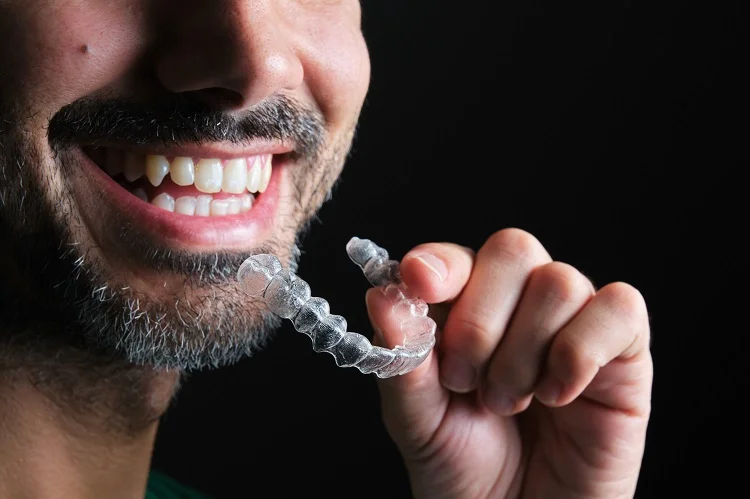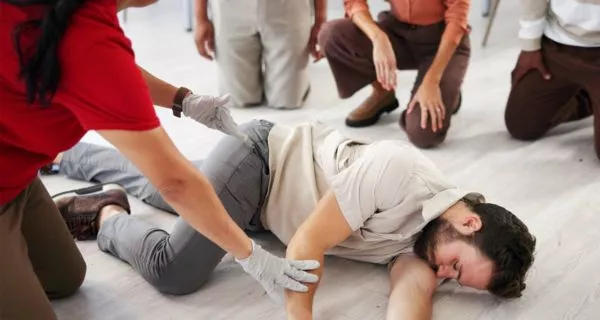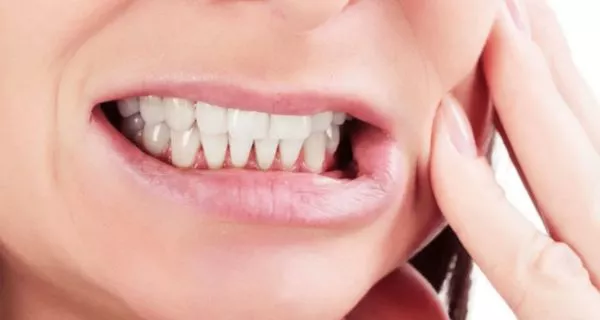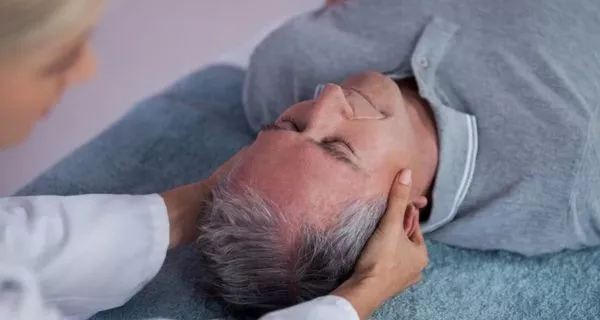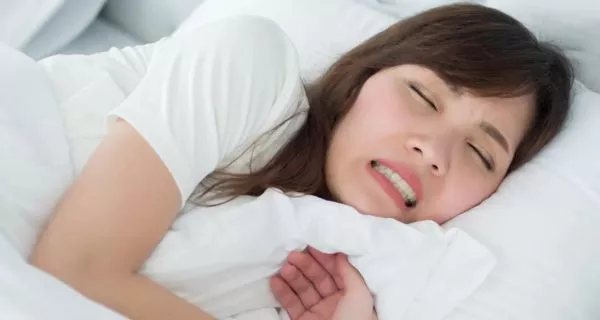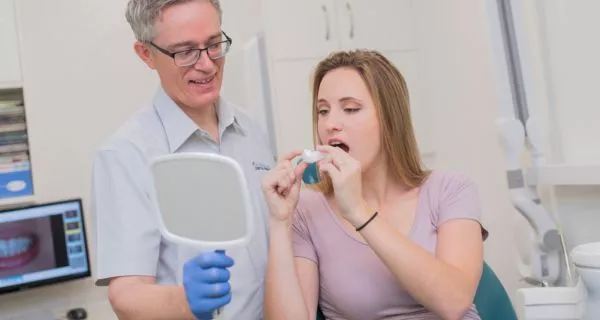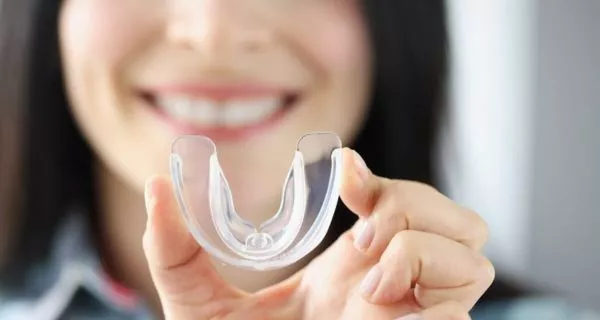Last Updated on: 24th January 2026, 08:39 am
Studies show that people with epilepsy have a higher risk of bruxism (clenching or grinding teeth). This is due to muscle movements during seizures and sleep problems related to epilepsy.
Today, many people live with stress, anxiety, or sleep problems, and one common result is bruxism – the habit of clenching or grinding the teeth without control. But did you know that not all bruxism comes from stress? In some cases, it can be linked to neurological conditions like epilepsy.
Epilepsy is often known for seizures and loss of consciousness, but it can also affect facial and jaw muscles, sometimes causing strong teeth grinding during or after a seizure.
This article explains in simple words how bruxism and epilepsy are connected, what the science says, and how to protect your teeth with good habits and mouthguards.
What is epilepsy and how is it different from a seizure?
Many people confuse epilepsy with a seizure, but they are not the same. Knowing the difference helps us to understand how they can relate to bruxism.
What is epilepsy?
Epilepsy is a neurological disorder where the brain sends abnormal and repeated electrical signals.
- It is not a mental illness and often controlled with medicines or therapy.
- According to the World Health Organization (WHO), about 50 million people around the world live with epilepsy.
- It can affect people of any age, and with the right treatment, most can live normal lives
What is a seizure?
A seizure is a short episode that occurs when the brain’s electrical activity changes suddenly.
During a seizure, a person may experience:
- uncontrolled shaking of the arms, legs, or head
- a loss of consciousness
- drooling, tongue biting, or loss of urine
However, not all seizures are caused by epilepsy. They can also appear due to:
- high fever (in children)
- low blood sugar
- alcohol or drug withdrawal
- stroke or heart problems
- infections like meningitis
During or after seizures, the jaw muscles contract strongly, leading to teeth clenching or grinding, one of the main signs of bruxism.
In short, epilepsy is the condition, and seizures are the episodes that ensue because of it.
What is bruxism?
Bruxism means grinding or clenching your teeth, often without realizing it.
It can happen when you are awake or asleep and may cause pain, tooth wear, or jaw problems.
What are the types of bruxism?
Daytime bruxism
- happens when you are awake
- usually caused by stress, tension, anger, or focus
- the person often doesn’t notice it
Nighttime bruxism
- happens while sleeping
- it is a sleep movement disorder
- it may come with snoring or sleep apnea
- common in children, but it can also affect adults
What causes bruxism?
Bruxism doesn’t always come from stress. Other possible causes are:
- crooked or misaligned teeth
- problems with the jaw joint (TMJ disorder)
- some medications or stimulants, like caffeine and alcohol
- neurological or sleep disorders
- muscle tension and bad posture
What are the symptoms of bruxism?
You might have bruxism if you notice:
- flat, chipped, or worn teeth
- pain in the jaw, neck, or face
- morning headaches or pressure in the temples
- sensitive teeth or ear-like pain
- difficulty opening or closing the mouth
- clicking or tension in the jaw joint
- biting the inside of the cheeks
- grinding sounds at night (someone else may hear it)
If you have epilepsy and any of these symptoms, it’s important to tell your dentist and neurologist; together, they can help protect your mouth and control the condition better.
What is the connection between epilepsy and bruxism?
Not everyone with epilepsy grinds their teeth, but some people do. During seizures, the muscles in the face and jaw move involuntarily. These movements can lead to clenching or grinding of the teeth.
What do studies show?
- Some studies suggest that epileptic seizures, especially in the temporal lobe, can activate chewing muscles.
- This may cause the person to grind or press their teeth strongly.
- Sleep problems are also common in epilepsy, and they can make nighttime bruxism worse.
While not all people with epilepsy have bruxism in fact, the two can happen concurrently, especially when seizures or poor sleep are involved.
What factors increase the risk?
Epilepsy may raise the risk of bruxism because of:
- muscle contractions during seizures
- sleep disorders, such as insomnia or sleep apnea
- side effects of medication that affect muscle tone or rest
Having epilepsy does not mean you will automatically grind your teeth, but it helps to watch for signs early and take preventive steps.
What happens during a seizure that causes teeth grinding?
During a seizure, the brain sends strong signals that make many muscles move, including the jaw muscles.
During the seizure:
- the jaw may close tightly.
- teeth may rub or grind together.
After the seizure, you may experience:
- stiffness in the jaw or neck
- head or face pain
- tooth wear or small cracks
- bruxism that continues during sleep
Sleep and Bruxism
- People with epilepsy often have disturbed sleep, waking many times or having breathing pauses.
- This can make sleep bruxism stronger and more frequent.
How can you treat or prevent bruxism if you have epilepsy?
There is no single cure for bruxism, but there are many ways to reduce pain and protect teeth. Treatment usually includes dental care, healthy habits, and sometimes mouthguards.
How often should you visit the dentist?
It’s important to visit your dentist every 6 months, or more often if needed.
- The dentist will check for tooth wear, cracks, or jaw problems caused by grinding.
- In some clinics, you can send your mouthguard for adjustments or repairs if it shows wear.
Regular check-ups help keep your teeth strong and your mouth healthy.
What kind of mouthguard should you use?
Mouthguards protect teeth and help relax jaw muscles during sleep or seizures. They are one of the best ways to prevent damage from bruxism.
- Ready-to-use: cheap, found in pharmacies or online, good for mild bruxism.
- Boil-and-bite (moldable): heat them in water and bite to shape, medium comfort, and price.
- Custom-made by a dentist: best protection, made from your mouth impression, and perfect for strong bruxism or epilepsy.
Look for a mouthguard that:
- fits well and stays firm in your mouth.
- it is made of hard acrylic or semi-rigid plastic.
- it is easy to clean and safe for breathing.
- comes from a trusted brand or has ADA approval.
If you have epilepsy, check your mouthguard often for cracks or looseness, and replace it when needed to stay safe.
What habits can help prevent bruxism?
Small daily changes can really help your teeth and jaw.
Healthy lifestyle habits:
Your daily routine has a big impact on your teeth and muscles. Try to:
- eschew caffeine, alcohol, and nicotine, especially at night.
- avoid chewing pens, pencils, or ice.
- keep your lips closed but teeth slightly apart to relax your jaw.
- exercise regularly to reduce body tension and stress.
- eat soft foods after seizures or when your jaw feels sore.
These actions help muscles relax and prevent extra pressure on teeth.
Better sleep habits
Good sleep helps both your brain and jaw muscles rest. To sleep better:
- Go to bed and wake up at the same time every day.
- Listen to calm music or meditate before sleeping.
- Avoid bright screens like phones or TVs before bed.
With these simple steps, you can lower muscle stress, protect your teeth, and even support seizure control.
What are the best mouthguards on Amazon?
There are many mouthguards available to buy online, but it’s always best to ask your dentist first before choosing one.
Here are some of the most popular options you can find on Amazon.
What are good starter mouthguards?
These are good if you are trying a mouthguard for the first time or if your bruxism is mild. They are easy to find and do not cost much.
- Plackers Grind No More Night Guard: ready to use, no boiling or molding required. Ideal if you have mild bruxism or need a quick, convenient solution.
- The ConfiDental Pack of 6 Moldable Mouth Guards: boil-and-bite design with five guards included. Great starter option or for multiple users.
- SleepRight ProRx Custom Dental Guard: slim, durable, and easy to mold, ideal for nighttime teeth grinding without bulky discomfort.
Tip: The above are great to test if a mouthguard helps you sleep better or reduce jaw pain.
What are the best moldable or mid-range mouthguards?
These afford a better fit and greater comfort. You can heat them in water and then bite gently to shape them to your teeth.
Plus, they offer a good balance between comfort, protection, and price.
- Oral‑B Nighttime Dental Guard: a budget-friendly, boil-and-bite night guard that molds in under 3 minutes to help protect your teeth from grinding and clenching.
- DenTek Ultimate Guard for Nighttime Teeth Grinding: mid-to-high-level option offering solid protection and comfort at a reasonable price.
- SOVA Aero Night Guard: Ultra-thin (1.6 mm), remoldable up to 20 times, breathable, and taste-free for effective protection against nighttime teeth grinding.
Tip: These are perfect if your teeth grinding happens often or if you want a long-lasting guard.
What are the best mouthguards for strong bruxism or epilepsy?
Custom-made mouthguards from your dentist offer the best protection and comfort. But some mouthguards offer high protection and durability.
They are recommended for people with severe bruxism, frequent seizures, or strong jaw pressure during sleep.
- DenTek Professional-Fit Dental Guard: professional-grade protector, ideal for users who need maximum protection and durability.
- The DreamEZ Anti‑Grinding Night Guard: premium boil-and-bite guard made in the USA, designed for heavy nighttime teeth grinding.
- The SleepGuard Mouth Guard for Teeth Grinding: another premium product, designed for serious bruxism or cases related to conditions like epilepsy.
Tip: If you have epilepsy, these guards are safe because they stay firm and protect teeth during seizures.
How can you protect your teeth if you have epilepsy and bruxism?
Bruxism and epilepsy are often linked through muscle tension and sleep problems.
If you notice teeth grinding, jaw pain, or cracked teeth, talk to your dentist and neurologist.
With a good mouthguard, healthy habits, and regular check-ups, you can protect your teeth, relax your jaw, and improve your sleep quality.
Remember: taking care of your mouth is also taking care of your brain and body.
Frequently Asked Questions
Can epilepsy cause bruxism?
How do I know if I grind my teeth at night?
Can mouthguards help people with epilepsy?
Should I tell my dentist that I have epilepsy?
Can good sleep help reduce bruxism and seizures?
Voice and Search (Q&A)
Is it normal to grind teeth during a seizure?
It can happen. The jaw muscles may contract strongly, causing teeth clenching or biting the tongue.
Can relaxation exercises help with bruxism?
Yes, breathing, meditation, or gentle stretching can lower stress and relax jaw muscles.
What doctor should I see for bruxism and epilepsy?
See both your dentist and neurologist; they will create a safe plan together.
Share
References
1. Ferreira, L. S., Faber, I., Reis, F., & Ferreira, D. (2013, June 4). Can bruxism be a sign of temporal lobe epilepsy? Case report of a child with bruxism and hippocampal cystic lesion. Periodikos. https://revodontolunesp.com.br/journal/rou/article/588018d47f8c9d0a098b4e3a
2. Minervini, G., Franco, R., Di Blasio, M., Martelli, M., Gargari, M., Bollero, P., & Cicciù, M. (2025). Prevalence of bruxism in patients affected by epilepsy: a systematic review and meta-analysis. Acta Odontologica Scandinavica, 84, 155–164. https://doi.org/10.2340/aos.v84.42959
3. Whelan, C. (2020, July 8). 6+ Remedies for Teeth grinding (Bruxism). Healthline. https://www.healthline.com/health/how-to-stop-grinding-teeth
4. World Health Organization: WHO. (2024, February 7). Epilepsy. https://www.who.int/news-room/fact-sheets/detail/epilepsy
5. Yetman, D. (2024, December 5). Identifying and treating nocturnal seizures. Healthline. https://www.healthline.com/health/epilepsy/nocturnal-seizures
-
Dr. Yeidy Carolina Mesa [Author]
DDS Yeidy Carolina Mesa Passionate Dentist | Advocate for Accessible Oral Health Education Graduating from Universidad CES in 2022, I am a dedicated general dentist with a lifelong passion for helping others and making a meaningful impact in the world. My journey into dentistry began at the age of 7, inspired by my own experience with braces and overcoming a fear of the dentist. This personal journey shaped my mission to help patients conquer their own dental anxieties and embrace a healthier,...
View all posts
-
Nayibe Cubillos M. [Medical Reviewer]
Pharmaceutical Chemestry |Pharmaceutical Process Management | Pharmaceutical Care | Pharmaceutical Services Audit | Pharmaceutical Services Process Consulting | Content Project Manager | SEO Knowledge | Content Writer | Leadership | Scrum Master
View all posts
A healthcare writer with a solid background in pharmaceutical chemistry and a thorough understanding of Colombian regulatory processes and comprehensive sector management, she has significant experience coordinating and leading multidisciplina...


